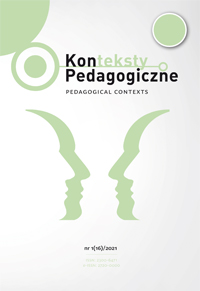Abstract
The research on subjective psychological well-being with 90 people – special educators and therapists working with disabled children and pupils in integrated and inclusive institutions (commonly accessible). The study focused on subjective well-being, reflected in 6 dimensions (self-acceptance, personal growth, life aims, environment mastery, autonomy and positive relationships with others) proves that respondents are generally satisfied with their lives, although the level of satisfaction varies in different aspects and decreases with age.
The research on subjective psychological well-being with 90 people – special educators and therapists working with disabled children and pupils in integrated and inclusive institutions (commonly accessible). The study focused on subjective well-being, reflected in 6 dimensions (self-acceptance, personal growth, life aims, environment mastery, autonomy and positive relationships with others) proves that respondents are generally satisfied with their lives, although the level of satisfaction varies in different aspects and decreases with age.
The research made it possible to analyze individual perception of life of the mentioned group of people as well as to propose undertaking various therapeutic activities helping to avoid professional burn-out and improve the quality of life.
References
Banach, C. (2004). Nauczyciel. W: T. Pilch (red.), Encyklopedia pedagogiczna XXI wieku, t. 3 (s. 548–553). Warszawa: Wydawnictwo Akademickie „Żak”.
Bartuś, E. (2014). Współczesny nauczyciel w świetle koncepcji Marii Grzegorzewskiej. W: E. Dyduch, A. Mikrut i J. Zielińska (red.), Idee Marii Grzegorzewskiej jako inspiracje rozwoju współczesnej pedagogiki specjalnej (s. 100–108). Kraków: Wydawnictwo Naukowe Uniwersytetu Pedagogicznego.
Błaszczyk, W., Januszkiewicz, K. i Śmigielski, J. (2006). Oblicza jakości życia. Człowiek w sytuacji pracy. Łódź: Wydawnictwo Uniwersytetu Łódzkiego.
Borys, T. (2004). Jakość, jakość życia oraz pojęcia i relacje pochodne. W: W. Ostasiewicz (red.), Ocena i analiza jakości życia (s. 48–76). Wrocław: Wydawnictwo Akademii Ekonomicznej im. Oskara Langego we Wrocławiu.
Cieślińska, J. (2013). Poczucie dobrostanu i optymizmu życiowego kadry kierowniczej placówek oświatowych. Studia Edukacyjne, 27, 95–112.
Czapiński, J. (2012). Ekonomia szczęścia i psychologia bogactwa. Nauka, 1, 51–88.
Czapiński, J. i in. (2015). Główne wyniki i wnioski. Diagnoza Społeczna 2015, Warunki i Jakość Życia Polaków – Raport. Contemporary Economics, 9/4, 14–24. DOI: 10.5709/ce.1897-9254.177.
GUS (2020). Jakość życia i kapitał społeczny w Polsce. Wyniki badania spójności społecznej 2018. Warszawa: GUS, https://stat.gov.pl/obszary-tematyczne/warunki-zycia/dochody-wydatki-i-warunki-zycia-ludnosci/jakosc-zycia-i-kapital-spoleczny-w-polsce-wyniki-badania-spojnosci-spolecznej-2018,4,3.html [dostęp: 27.10.2020].
Jezierska, B. (2003). Autonomia. W: T. Pilch (red.), Encyklopedia pedagogiczna XXI wieku (s. 244–246). Warszawa: Wydawnictwo Akademickie „Żak”.
Karaś, D. i Cieciuch, J. (2017). Polska adaptacja Kwestionariusza dobrostanu (Psychological Well-Being Scales) Caroll Ryff. Roczniki Psychologiczne/Annalas of Psychology, XX, 4, 815–835. DOI: http://dx.doi.org/10.18290/rpsych.2017.20.4-4pl.
Niśkiweicz, Z. (2016). Dobrostan psychiczny i jego rola w życiu człowieka. Studia Krytyczne, 3, 139–151. DOI: 10.25167/sk.
Sęk, H. (2000). Wypalenie zawodowe. Psychologiczne mechanizmy i uwarunkowania. Poznań: Zakład Wydawniczy K. Domke.
Wojciechowska, L. (2008a). Style starzenia się a subiektywny dobrostan kobiet w późnej dorosłości, studiujących na Uniwersytecie Trzeciego wieku. Polskie Forum Psychologiczne, 13, 2, 106–123.
Wojciechowska, L. (2008b). Syndrom pustego gniazda. Dobrostan matek usamodzielniających się dzieci. Warszawa: Wydawnictwo Instytutu Psychologii PAN.
In accordance with the recommendation of the Ministry of Science and Higher Education, which aims to counteract the practice of “ghostwriting” and “guest authorship,” all authors submitting their text for publication should attach an author’s statement which declares the contribution of each of the authors to the article. The printed and signed statement should be delivered by mail or other means to editor-in-chief Joanna Skibska or sent in the form of a scan to the following e-mail address: redakcja@kontekstypedagogczne.pl. The authors will not receive remuneration for publishing their papers. The editors reserve the right to make minor editorial changes to the articles which will not affect the substance of the article. We encourage all authors to prepare their articles in accordance with the guidelines for manuscript preparation. Download pdf file.
Authors transfer all copyrights and grant the journal the right of first publication with the work simultaneously licensed under a Creative Commons Attribution License that allows others to share the work with acknowledgement of the work's authorship and initial publication in this journal. All authors agree to the publishing of their email addresses, affiliations and short bio statements with their articles during the submission process.

